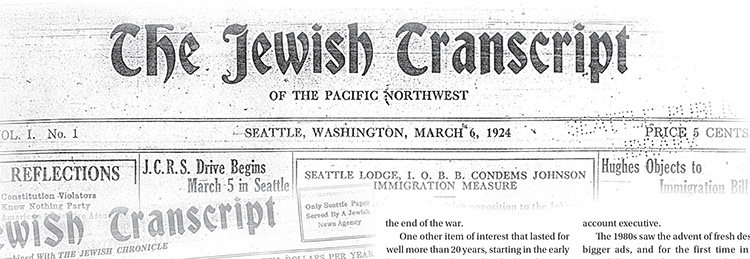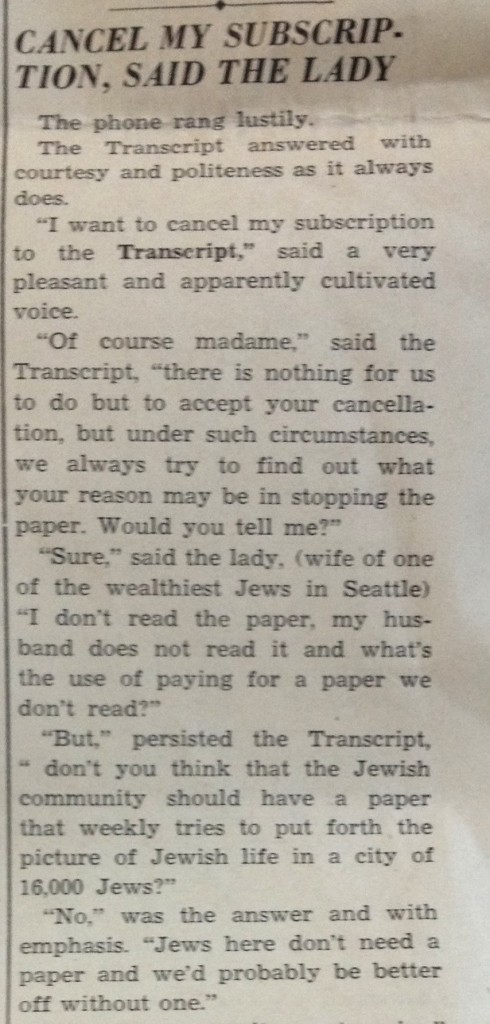On March 6, 1924, the shtetl that was Seattle’s Jewish community saw these words hawked on their Central District street corners:
Announcement! To the Jewish people of the Pacific Northwest: At numerous times during the last ten years it has been suggested to me that the publication of a Jewish weekly newspaper was a public necessity and that as an American citizen and a Jew it was my duty to assist in founding such an enterprise.
I don’t know why it was Herman Horowitz to whom people came when they decided there should be a newspaper that covers our state’s Jewish community, or what he gave up to create the labor of love, sweat and ink that became The Jewish Transcript. But for nearly 90 years, the Transcript, as people refer to it (though eight years ago the name was shortened to JTNews), has served its mission as that public necessity.
But the question of whether a Jewish newspaper — or Jewish news in general — serves the people beyond those who work inside our community pops up in my mind from time to time. It came up a few weeks ago when I was sitting in the social hall of my synagogue, at an event for the parents of Sunday school kids, and several of the people sitting at my table had no idea such a thing as a Jewish newspaper existed! And that’s despite the fact that dozens of copies of the paper get put out in the lobby of my temple every time we publish! Or I hear on occasion from an observant person who chooses to have nothing to do with the paper because it isn’t religious enough — in other words, if it’s not Talmudic, it’s not Jewish.

Old News: Headlines from early 20th century copies of Seattle’s Jewish Transcript. Images courtesy of Joel Magalnick.
I have been lucky enough in the ten years of my job as editor of this newspaper to have crossed paths with 2011 Stroum lecturer Jonathan Sarna (click here to view the lectures he gave in Seattle). Brandeis University’s Prof. Sarna, if you don’t know him, sits atop the pyramid of scholars of American Jewish history. One of the things Prof. Sarna said at a conference of Jewish press professionals I attended in Philadelphia last year was that as the leaders of the Jewish press, we are writing the first draft of our community history.
When you look at my job like that, those are some big shoes to fill. As a newspaper of record, people do search our archives in the hopes of finding some nugget about a family member or a community scandal. More often than not, I’m sure most of us who work in the Jewish press don’t think of it that way because we’re too busy trying to fill our column inches and figuring out how to pay our freelancers.
And that’s where our mission, our role, our raison d’être gets murky. Because Sarna has also noted that the history of Jewish newspapers has not always been rosy. In this paper he presented in 1995, Sarna asked: “Why did the once varied and vibrant world of Jewish journalism in the United States deteriorate into the so-called ‘weaklies’ that Jewish leaders like Stephen S. Wise used so regularly to deride?”
He pointed to the rise of local Jewish newspapers, exactly the kind I helm, that focused narrowly on local events, like mine does. He also pointed to the difficulties of financial sustainability, even as far back as the 1940s, that led to agencies such as Jewish Federations to back the papers. “Inevitably, this financial dependence affected the ability of local Jewish newspapers to remain independent—as we say in Hebrew, baal ha-meah, baal hadeah (translated idiomatically, that means ‘he who pays the piper picks the tune’),” he wrote.
JTNews, incidentally, is owned by the Jewish Federation of Greater Seattle. I would say, however, that we are blessed in that Seattle’s Federation has by and large let this newspaper have an independent voice. That is not always the case among many of my colleagues’ Federation-owned papers across the country.
That brings me to the point of relevance. What makes us relevant? Is it our opinion page, which often broadcasts voices that can be found elsewhere, though more in the darkest reaches of our little niche? Is it our coverage of Israel, most of which comes from our wire service, the Jewish Telegraphic Agency, and can be read online as early as a week before our paper goes to press?
Speaking of online, everybody talks about the decline of newspapers, and the rush to get online. Yes, we’re online. Yes, we try to be proactive in publishing our content on the web before you find it in your mailbox. But we pay our salaries and our writers through the print advertising, and without that, you get no local Jewish press.
Most of what this paper prints is local, and by and large it is information that could not and mostly would not see the light of day if we didn’t write about it. If one believes that there is a need for Jewish community news, then we definitely fill that need.

Tough Customer: This column from a 1942 edition of Seattle’s Jewish Transcript reveals that not everyone in the community supported the idea of a local Jewish newspaper.
But, again, relevance: The Seattle Times sure as heck doesn’t care what the Federation allocated to the local Jewish agencies this year. The leaders of our local Jewish agencies sure do. But our regular subscribers?
If we print recipes for latkes, do people keep their iPads powered on as they follow the instructions or clip it out and keep it year after oil-stained year? Or with today’s food gods like Alton Brown or Smitten Kitchen, is a cooking column redundant?
I’m considering starting a column on kosher food finds around the city. It’s certainly useful for a healthy chunk of our readers. But can we make something like that readable enough that people would come back to it?
Then again, we spent eight years coming back to the issue of marriage equality and received a lot of feedback both positive and negative. Jews voted overwhelmingly in favor when marriage was on the ballot this year, and we have been commended for our editorial stance on the issue. But again, not everyone was thrilled. That, as far as being a voice for the community goes, is how it should be.
Journalists are constantly torn between the classic dilemma what their readers want (anything Kardashian) and what they “need” to know. If there’s any indication as to what people are interested in, however, it’s what gets liked and shared on our Facebook page. Let’s just say the Israeli-Palestinian conflict isn’t winning.
There’s no shortage of people in this town who tell us what a Jewish newspaper should be. A much more important — and philosophical — discussion is why a Jewish newspaper should be.
Joel Magalnick has been the editor of JTNews, which has provided news coverage of our state’s Jewish community since 1924, for the past decade. He is a member of the 2012-2013 Editorial Council for jewishstudies.washington.edu. He lives in Seattle with his wife and two children, and he can’t go anywhere in this town without running into somebody Jewish.



![Muestros Artistas [Our Artists]: Bringing Sephardic Art and Community Together at the UW](https://jewishstudies.washington.edu/wp-content/uploads/2023/08/UWJS_Muestros-Artistas-cropped-500x383.jpg)


